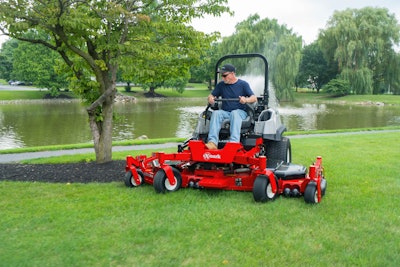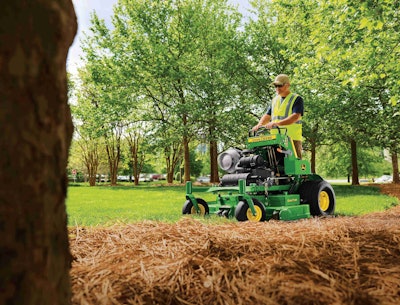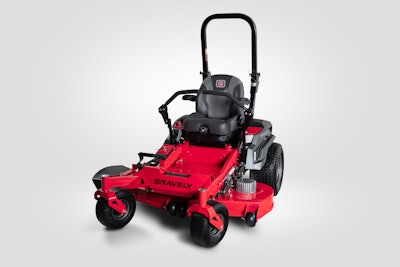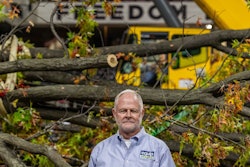 Photo: Exmark
Photo: ExmarkWhile gas is currently king when it comes to fuel sources for mowers, there are many landscapers looking into alternative fuels in order to become cost-efficient or more environmentally friendly.
“There are many factors contributing to the growth of alternative fuels,” says Matt Medden, vice president of marketing for AriensCo. “In addition to being more environmentally sustainable, alternative fuels can be more economical and meet consumer demand for more environmentally friendly products and services.”
Below are three of the fuel types landscapers are switching to as well as manufacturers’ thoughts on these power sources.
Diesel
Coming in second to gasoline in popularity is diesel. Although diesel and gasoline are both derived from crude oil, the two fuels have different molecular structures, and they also differ in how they burn and create energy.
Thanks to its higher density, diesel gets better mileage than gas, meaning less fuel is required to generate the same power.
 Joe Cooper, owner of Reliable Lawn Care based in Winona, Minnesota, says he likes the power Grasshopper’s diesel mower provides.
Joe Cooper, owner of Reliable Lawn Care based in Winona, Minnesota, says he likes the power Grasshopper’s diesel mower provides.Photo: Grasshopper
Joe Cooper, owner of Reliable Lawn Care based in Winona, Minnesota, uses Grasshopper diesel mowers in his fleet and says the factors that matter the most to him when choosing his fuel source are the availability of the fuel and the cost.
He says he opted for diesel mowers because of the extra power they provide and the durability.
“The fuel costs might be a concern for somebody, but you get better fuel economy with the diesel engine, even though your fuel costs more; I think it goes farther,” Cooper says.
According to Jamie Briggs, director of marketing for Exmark, there has been increased interest in diesel due to the productivity it offers. Exmark introduced its Lazer Z Diesel model at the 2017 GIE+EXPO and Briggs says it has been well-received by landscapers.
Dan Caldwell, owner of Lawns by Caldwell, based in Oklahoma City, Oklahoma, says he runs about a dozen diesel mowers and likes the Exmark 96-inch Lazer Z Diesel mower thanks to its efficiency.
“The 96-inch mower cuts down on labor because you can mow the same amount with one person on the machine compared to three 60-inch mowers, so it saves a lot of time and labor,” Caldwell says.
“Fuel consumption is significantly less than gas-powered engines,” Briggs says. “And with their torque and power, they’re able to cut more grass in less time using the diesel.”
Mike Simmon, marketing coordinator for Grasshopper says that while landscapers may pay more at the pump or per gallon for diesel, they will use less of it over time compared to gasoline or propane, which tend to burn a gallon and a half per hour.
There are some drawbacks to using diesel. Crews, accustomed to using gasoline, may mistakenly put gas in a diesel tank. Another limitation is the number of locations at which crews can refuel. Simmon says while diesel outlets are becoming more common, they are still not as abundant as some would believe.
Cooper says the cost of the machines is what is off-putting to most landscapers, as these models tend to $2,000 to $3,000 higher than a comparable gas mower.
While these diesel-powered machines have more horsepower, better fuel economy and a longer engine life, they’re only worth the investment if you plan to keep the machines long term.
“If you’re going to put 100 hours on it a year, there’s no point buying a diesel engine unless you just want the power,” Cooper says. “If you put a thousand hours on it a year, you’re going to save money with a diesel engine.”
Simmon says the upfront cost only makes sense for those who plan to keep their equipment for four years or more. Those who trade in their models every two or three years won’t be able to fully recoup their costs in that amount of time.
Propane
Propane has also seen growth in popularity over the past few years, thanks to more OEMs manufacturing propane models.
More than 150 propane mower models are now produced by 14 manufacturers in a variety of configurations, including zero-turn and stand-on units, according to Jeremy Wishart, director of off-road business development for the Propane Education & Research Council (PERC).
“Propane is another popular alternative, especially in metro areas that have higher air quality standards,” says Nick Minas, product manager, John Deere Commercial Mowing. “We currently offer a dealer-installed propane conversion kit for our zero-turn, stand-on and commercial walk-behind mowers. Additionally, this kit can be used to retrofit many John Deere mowers from previous model years.”
There are around 20,000 commercial propane mowers in operation across the country, which is about 5 percent of the total commercial mower market. Compare this to 2012 when only a few hundred propane mowers were in operation.
 Scott Dudley, owner of Total Lawn Care based in Jackson, Mississippi, made sure to test drive a converted propane mower before making the switch.
Scott Dudley, owner of Total Lawn Care based in Jackson, Mississippi, made sure to test drive a converted propane mower before making the switch.Photo: PERC
The pros of propane include lower operating costs, longer engine life and cleaner burning fuel.
Scott Dudley, owner of Total Lawn Care based in Jackson, Mississippi, has been running a propane fleet since 2010 and made the switch to save on fuel costs.
“We figure we save about 25 dollars per day with just my fleet,” Dudley says. “That will differ depending on how much gas you burn in a day, but we average about 25 gallons per day, so about a dollar a gallon in savings. Twenty-five bucks isn’t much except for when you figure it over a ninth-month growing season in a year; it adds up quickly.”
According to Wishart, propane reduces source energy use by 20 percent, greenhouse gas emissions by 17 percent, NOx emissions by 19 percent and SOx emissions by 16 percent.
“This is obviously better for the environment — a fact landscapers can leverage when marketing to environmentally-conscious clients to grow business,” Wishart says. “Commercial clients, for example, are increasingly seeking environmentally friendly methods to support their own corporate sustainability efforts. Homeowners are also becoming increasingly attuned to the potential impact of engine emissions.”
Lawn Butler, based in Knoxville, Tennessee, made the switch to propane over five years ago and since swapping its fleet, says fuel costs have decreased thanks to the ability to buy a certain amount of propane at the beginning of the year to lock in its rate.
“One of the biggest pros is from a budgetary standpoint,” says Seth Kehne, president of Lawn Butler. “We’re able to be right on target with our budget as opposed to fluctuating with gasoline, like we do with our trucks.”
In addition, Lawn Butler doesn’t worry about theft or spills with propane. “It’s clean burning, so guys riding around breathing it in are safe,” Kehne says. “It’s sustainable and our engines live longer and we actually can push our maintenance a little bit longer between oil changes.”
Lawn Butler has an on-site propane tank that a vendor refills regularly, making it easy for crew members to grab a tank and go. Kehne says landscaping companies would need at least six pieces of equipment running every day for this sort of investment to be worthwhile.
 As John Deere sees increased interest from its customers in alternative fuels, it says the company is committed to providing the various fuel options to meet their needs.
As John Deere sees increased interest from its customers in alternative fuels, it says the company is committed to providing the various fuel options to meet their needs.Photo: John Deere
Dudley says that by switching to propane, he’s seen significant time savings by cutting down on the number of gas station visits.
“When I pull three trucks to the gas station and eight or nine guys get out, we’re going to be there an hour,” Dudley says. “With propane, we’ve cut that out. They stop at the store on their way to work and when we leave the shop, we go to the first job site.”
Some of the biggest barriers for propane right now are the cost of acquisition, equipment resale values and landscapers’ predisposition to gasoline.
“Propane’s biggest challenge is competing with the status quo,” Wishart says. “You never hear contractors say they love gasoline; they use it because it’s what they’ve always used, plain and simple. Getting contractors to think beyond how they’ve always operated and realize that there are other fuel sources better suited for the work they’re doing will always be our number one challenge and top priority.”
For the landscaping companies that might be reluctant to pay the higher prices for propane equipment, there are rebates by PERC’s Propane Mower Incentive Program that offer contractors $1,000 for every new propane mower purchase and $500 for every mower conversion.
“While we’ve always had healthy participation since the program first launched in 2012, we’re now seeing more second- and third-time applicants, reinforcing the belief that once a contractor converts to propane, there is no going back to gasoline,” says Wishart.
Wishart says the incentive is more of a perk than a necessity, and many contractors have made the switch without using the program and still experienced a positive ROI.
Kehne says he felt it was important to be a good steward of the environment and had decided to switch to propane even if it was going to cost the company a little more.
“If we have the ability, where it’s close in costs, we’ll do the more sustainable option,” Kehne says. “Our employees really like it, as well.”
Both Kehne and Briggs say a disadvantage of propane mowers is the challenge of reselling the product into the secondary market due to the limited number of contractors looking to buy propane units.
Electricity/battery
As battery power advances in the automotive industry and with handheld tools, many mower manufacturers have started monitoring and taking this power source for zero-turn mowers more seriously.
 Greenworks debuted its first battery-powered ZTR in 2018.
Greenworks debuted its first battery-powered ZTR in 2018.Photo: Greenworks
“As is occurring in the transportation industry, the adoption of electrification is a long process and depends on the availability of power solutions that make sense both economically and environmentally,” Minas says. “We expect that electrification adoption will increase over time and are actively pursuing solutions that meet all customer needs.”
Greg Mosteller, owner of U.S. Lawns of Hickory, based in Hickory, North Carolina, says they switched to battery power to perform research for U.S. Lawns to evaluate and develop a battery-powered equipment program. Mosteller has been using Greenworks products as they reached out to him, but he says if he’d known about Greenworks prior he would have tried their commercial equipment line.
“Believe it or not, the Greenworks Commercial ride-on and stander ZTR mowers are more powerful than their gas-powered counterparts,” Mosteller says.
The benefits of battery-powered mowers are reduced operational costs, quieter operation and zero emissions.
“Customer reaction to our using the Greenworks battery equipment has been very receptive,” Mosteller says. “The customers like the look of the equipment and the quiet operation, especially at our schools and HOAs! The customers also like the quality of service they get when we use the Greenworks equipment.”
Matt Parsons, president of Parsons Landscaping based in Fort Myers, Florida, started shifting to battery power in 2018 and has been running Mean Green Mowers. He was originally concerned about the run time, but he says he gets six to eight hours of run time out of his electric mowers.
 Matt Parsons opts to run Mean Green Mowers.
Matt Parsons opts to run Mean Green Mowers.Photo: Parsons Landscaping
“I’m not trying to just market it or use it as a marketing tool to say, ‘Hey we’re electric and use us and we’re going to charge you more,’” Parsons says. “We’re implementing it within our existing service plans where it makes sense. We’re pretty close to fully electric on several of the crews now.”
Parsons says that his customers do appreciate the quiet nature of the battery-powered mowers.
The two major barriers for battery power are the upfront costs and the run time of the mowers.
Tony Marchese, VP of Sales and Operations for the Commercial Business Unit, Greenworks North America, argues that it is more about perception when it comes to these two challenges.
 The EVZT is Gravely’s first lithium-ion battery-powered commercial mower and it is expected to arrive summer 2020.
The EVZT is Gravely’s first lithium-ion battery-powered commercial mower and it is expected to arrive summer 2020.Photo: Gravely
“Typically, customers focus on run time – it isn’t top of mind how long a mower will run on a full tank of gas, but it is when someone asks about battery – just drop in a charged battery, and now you have a ‘full tank’ same as pouring in tank from a portable gas can,” Marchese says. “But how much did it cost for that tank of gas versus the charge to the battery? A few dollars versus pennies. And conversion cost, it costs money to make the switch from gas to battery, but the savings in year-one alone will cover the startup costs.”
Medden says Gravely is committed to being on the leading edge of technology in the industry and recognizes the importance of battery power to the future of lawn care. He says battery-powered zero-turns currently in the market are not comparable to gas models.
“Our intention with our EVZT platform is to deliver the performance landscapers expect and the run time they need,” Medden says. “The technology must meet professional landscapers’ needs on run-time and showcase economic benefits. That’s where the Gravely EVZT platform comes in, offering performance to rival gas and a reduced cost of ownership in terms of maintenance costs.”
The future
When the question is posed if any fuel will ever overtake gas, the responses are a mixed bag for sure.
Cooper and Caldwell don’t see gas ever being overthrown due to the costly nature of switching to other fuel sources. Mosteller is in agreement that at the end of the day, it all comes down to cost.
“I really do not believe anything will ever overtake gas unless the government bans gas to save the environment,” Mosteller says. “Run times, power and longevity will all have to be improved on the alternative powered commercial equipment. But the biggest reason is the alternative powered (especially battery powered) are just too costly initially for the average landscape company to come up with that kind of upfront money to justify the purchase.”
 Diesel models offer more power for landscapers.
Diesel models offer more power for landscapers.Photo: John Deere
If the battery price point ever got to the same price as gas-powered mowers, Mosteller says he could see battery-powered mowers taking over the landscape industry.
“The Greenworks ZTRs are as powerful as the gasoline powered equipment,” Mosteller says. “I know the selling point is on the overall savings (i.e. less service, no fuel cost, no oil, no belts, no filters, etc. and all that will save money). But a landscape contractor is going to look at that initial upfront cost first and make a decision because in most cases a commercial contractor is changing equipment every two or three years, and that initial cost is going to have to be less and I am not sure that will ever come to be.”
Minas believes that as technology continues to evolve, the ability for battery-powered mowers to compete with gas, diesel and propane mowers will increase.
“However, the ability to mow all day at a competitive price is key to changing that perception,” Minas says. “We are continuing to explore options to correctly solve the electrification value equation, while still offering a wide range of gas, diesel and propane solutions that offer the comfort, reliability and performance our customers need.”
Medden says if you look far enough into the future, lithium ion has the potential to overtake gas. He adds that regulations on emissions and noise levels are expected to drive the demand for battery power as well.
Meanwhile, Parsons says battery power is absolutely the future, but the timetable is uncertain.
“I don’t know the timeline,” Parsons says. “That’s the one that up for a lot of debate right now. You’ve got the gas guys saying it’ll never happen and the electric guys saying it’s going to happen next year. I think it’s going to take a little bit longer for companies to adopt it but yes, it will become mainstream.”









